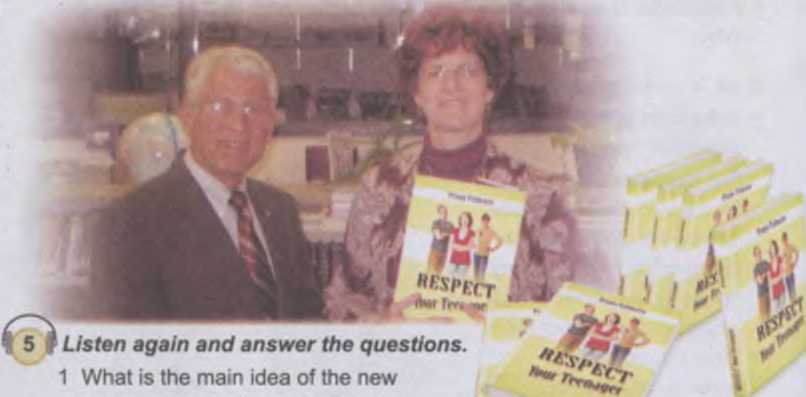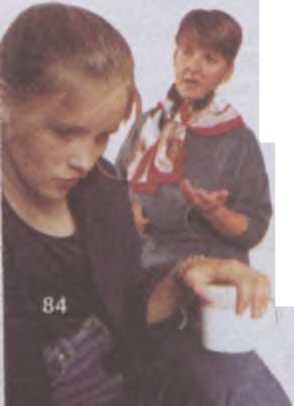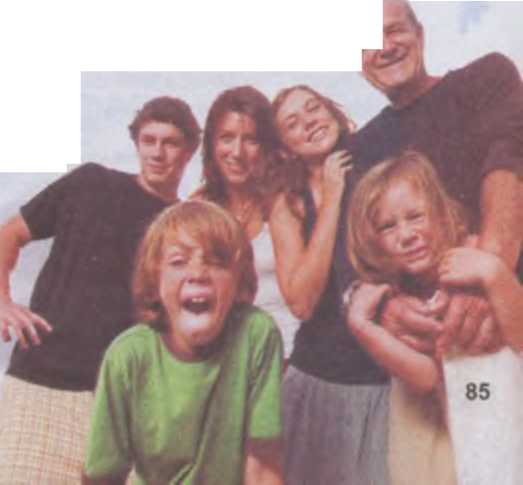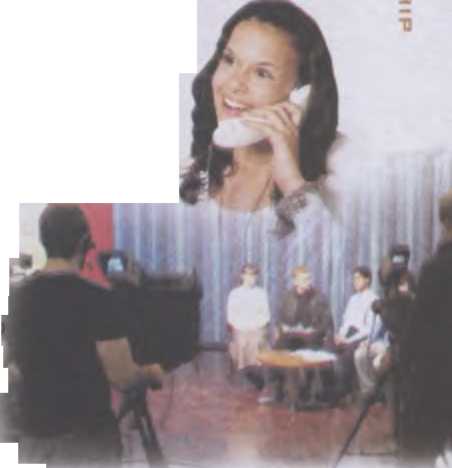
- •Англ1йська мова
- •Видано за рахунок державних коштчв. Продаж заборонено.
- •Contents
- •I ntr о цш cto ry review
- •Read the article quickly. Refer its
- •Read the article again and discuss the questions in groups.
- •Present time
- •Past time
- •Future time
- •Ask and answer in pairs.
- •Read the instructions and write a letter.
- •5J Discuss the following questions in groups.
- •A) Skim the short article in one minute. Which of the following sentences describes the main idea of the text?
- •Look at the numbers below and say what they refer to. Match each number with its reference.
- •Scan the text again in 30 seconds to check your answers in (b).
- •3A bateau [’baetao] — плоскодонний човен
- •In groups, try to find as many English words that have entered your language as you can. The winner is the group with the longest list. Set a time limit.
- •Make the longest meaningful sentence using these words.
- •Indirect questions
- •Implication (,impirkei(n| вппутуваиия;
- •Пщручник для 11 класу загальноосвггжх навчальних закладйв. Р1вень стандарту
- •Видано за рахунок дсржавних коигпв. Продаж заборонений.
- •46006, М. Тернопть, вул. Гайова, 8 Свщоцтво про внесения до Державного реестру суб’ектш видавничо! справи tp Ne 28 вщ 9.06.2005 р.
- •61024. М. Харюв, вул ОльмЫського. 17.
- •Work in groups.
- •Interview one of the students to find out what helps him/her to achieve good results in this or that subject.
- •Share your results with other groups.
- •Read the text (page 24) and complete its paragraphs (1-7) with the suitable words or word combinations (a-g).
- •In groups, discuss why different types of dictionaries are valuable.
- •Vocabulary °
- •Refer each sentence to the correct type of Conditionals (I or II).
- •Fill in the gaps with the appropriate form of the verb in brackets.
- •It sounds like...
- •It reminds me of ...
- •1 The case for coeds1
- •Is a person or company that
- •Introductory paragraph Paragraph 1
- •Introductory paragraph Paragraph 1
- •1Лаааая
- •3Rd conditional
- •Complete the text with the words from the box.
- •VMtTariah TtRriMl maDt vith qoat's che.E.Sl amo auurgiMtS
- •I'll find out what's happened to it.
- •Work in pairs. Find out which of the above dishes your partner would or wouldn't like to try and why.
- •Use the reporting verbs in brackets to report the following statements.
- •Work in pairs. Complete the dialogue with the sentences below (a-f) and dramatise It
- •The Traditional Healthy
- •Vegetarian Diet Pyramid
- •Is it possible for everyone to follow such a diet? Is it necessary to do so?
- •If it Is advisable to do so or not?
- •Introductory paragraph Paragraph 1
- •Introductory paragraph Paragraph 1
- •Visit their website: network.Org.Ua or call.
- •If you have any questions about
- •It's free!
- •1 A) Guess the meanings of the following words (1-6) and match them with their definitions (a-f).
- •Infinitive and gerund (-4ng form) revision
- •6 F Listen to the song and sing it along.
- •It note for note,
- •4) In groups, choose one of the topics (ы0) and discuss it. Complete the table 'Problems. Solutions. Results'. See the example on oaae 229
- •Politics
- •Gerund (-ing form)
- •Participle I (0,1, II, III)
3Rd conditional
We use the Third Conditional for imaginary situations in the past. Example: If it had been sunny, we should have gone sailing
(But it wasn't sunny so we didn't go sailing.)
We can also use:
other modals to show how possible or sure the result was.
 Example:
If
it had been sunny, we could
/
might
have
gone sailing.
Example:
If
it had been sunny, we could
/
might
have
gone sailing.
the Perfect Continuous Example: If I had been feeling tired, I wouldn't have been driving.
passive forms Example: The medicine shouldn't have been discovered rf there
hadn't been an accident.
|
If ♦ Past Perfect |
would have |
♦ 3rd form (Past Participle) |
Positive |
If it had been sunny, |
we would have |
gone sailing. |
Negative |
if I hadn't gone skiing. |
I wouldn’t have |
broken my leg |
Question |
If you had had the money. |
would you have |
bought the house? |
Choose the correct form of the 3rd Conditional.
If the Titanic (didn't hit I hadn't hit) an iceberg, it (wouldn't have sunk I doesn't sink).
If the Aztecs (had defeated I defeated) Cortes' soldiers, the Spanish (mightn't conquered I mightn't have conquered) Mexico.
What (happened I would have happened) if Columbus (thought / had thought) the world was flat?
If the Tsar's soldiers (hadn't shot / wouldn't shoot) demonstrating workers in 1905. there (mightn't been I mightn't have been) a revolution in Russia.
John Kennedy (couldn't be assassinated I mightn't have been assassinated) in 1963 if he (hadn't been travelling / hadn't travelling) in an open-top car.
Write sentences using the 3rd Conditional.
I / recognise / you / if / it / not be / dark
I'd have recognised you if it hadn't been dark.
If / my alarm / not ring / this morning /1 / be / late for work
If / you / ask / politely /1 / lend / you / my car
If / we / save / more money / we / might / be able to / afford / a holiday abroad
If I you / read I the instructions / you / not break / the washing machine
If I you / not remind I me HI forgot / pay / my tax bill
Complete the sentences following one of the patterns for the 3rd Conditional (see ‘Grammar Point').
I would have enjoyed the party much more if....
It... if the sea hadn't been so rough.
Would you have been able to come next Tuesday if...?
If you had taken my advice
If I had realised that you were really serious in what you said ....
If it hadn't been for the fact that his father had influence ....
If he had told me the truth in the first place ....
Would you have lent him the money if... ?
Refresh your knowledge of Conditionals I, II, III and make up the sentences using the prompts below.
 Example:
to rain —
not to go there
Example:
to rain —
not to go there
If it rains, I will not go there.
If it rained, I would not go there.
If it had rained, I would not have gone there.
to have money — to buy a new car
to employ her — not to have the right qualifications
to pass the exam — to study more
to win the game — to train hard
to buy the house — to be cheap

Choose the 2nd or the 3rd Conditional form to complete each
to be offered the job — to take it
sentence. Use negatives if they are required.
I would go skiing more often if we lived (live) closer to the ski resorts.
The snow ... (dean) if I had had a shovel.
If I had a key. I... (let) you inside.
If John ... (be) in town, he would invite you to this new restaurant.
If I... (know) you were coming, I would have thrown a party.
If he had given her his email address, she ... (send) him the price list.
If we ... (get) lost, we would have amved on time.
Where would you live if you ... (have) this house?
Choose the correct option to compete each sentence.
If you want to put on weight, you Q more regularly.
a) should have eaten b) should eat c) would have eaten d) would eat
We hope that we О the way.
a) will find b) find c) would find d) found
We hoped that we Q the way when we got lost in the subway.
a) will find b) would find c) would have found d) shall find
If she Q you. she would be much stricter.
a) was b) were c) has been d) had been
If she Q longer, tell me in advance.
a) staying b) stayed c) stay d) is staying
If you Q rehearsing, 111 call the audience in.
a) will finish b) finished c) have finished d) had finished
If we Q in a big city, we would visit the theatre more often.
live b) have lived c) have been living d) lived
LISTENING
1
Which of the personal adjectives in task 1 on page 79 describe your parents' attitude to you as a teenager? Why?
Which adjectives describe your attitude to your parents as a teenager? Why?
sometimes
m
\
*4
2
Make a list of things that parents say about their teenage children. For example:
He's so untidy! He's always leaving his clothes on the bathroom floori She’s very hard-working. She spends hours studying in her room.
What do you think parents can do to live happily with their teenage children?
For example:
Listen to what their children say.
![]()
Q LISTENING
approach
to dealing with difficult

teenagers that Penny Paimano offers?
How many children does Paimano have?
Has she got any problems with clearing up at home?
Do teenagers annoy their parents intentionally?
Why can't many teenagers make good decisions and control their emotions?
What does Penny believe the keys to happiness for all are?
What does Paimano advise to do if a teenager comes home a little bit later that it was agreed?
Is it important to criticise a teenager for having an untidy room? Why?

In pairs, do the task below.
Write down on a piece of paper three things teenagers do. which their parents find annoying. Pass the paper to another student. Take turns to tell each other what parents should do to deal with the things that annoy them
WORD <
FILE an approach (a'praotfl an intention hn'tenjnl a judgement I'djAdjmantl a negotiation [m.gaofi'eijnl to annoy la'noi) to assume (a'sjuiml irritating |’inteitig|
to bring up
treat
their parents in the way they'd like to be treated themselves
be
good friends to their brothers and sisters
develop
a sense of responsibility in their children
spoil
their children in every possible way
never
forget to praise their children when they deserve it
be
genuinely interested in their parents’ problems
don't
give their children any freedom of choice or give them too much
freedom
not
to treat all the children in the family equally, have favourites
afways
find time to spend with their children, hear them out and discuss
their problems
raise
their kids
be
prepared to compromise and meet their parents halfway
make
children feel low or ignored
give
promises and break them
give
their children plenty of love and patience
do
their best to develop their children's minds and give them a good
education
offer
any possible help to their parents
lose
their temper and shout at their kids
take
part in all sorts of activities that can unite their families
criticise
their children too much and deprive’ them of self-respect and
self-confidence
try
and make the atmosphere in the house cheerful and friendly
teach
their children to be virtuous and decent2
to other people
teach
them good manners
С
Good
children |
A
Successful parents
'to
deprive (di'praivl
—
позбавляти
'decent
(’di:sntl
—
пристойний,
порядний
В
It
is not advisable for adults
Refer
the phrases (1-22) to the appropriate headings (A-C).
Explain
your choice.

SPEAKING
3 Read
and express your opinion on the following.
Read
and express your opinion on the following.

WORD
FILE
Many people say we have a responsibility to look after the elderly people in our family or community. Why is it important to take care of them? How should we take care of elderly people?
a
community |kd*mju:nati) a generation Ldjena'reiJnl an innocence
('mdsnsl a madman I'maedmanl to avoid smth Id'vaidl to disturb
|dt'st3:b| to encourage Im'kAndjI to overcome [.аоуэ'клт]
to
recognise I'rekagnaizl
Can young people understand old people?
Can old people have an understanding of the young?
What do you think about the saying “If I knew then what I know now’ or “Childhood days are the happiest days’?
What do you think about the relationship between innocence and experience?
Can you give some examples of the generation gap from your own experience?
Can this gap be overcome? What causes it?
If you listen to music at full blast, do you think about possibly disturbing somebody else's peace?
Can you imagine a situation, in which you and your parents exchange roles?
What would be the same, and what would be different?
What is your relationship with your grandparents?
Do you feel a generation gap there?
What is your relationship with your parents?
Can you compare your relationship with your parents to their relationship with their parents?
Can you imagine your grandparents' childhood?
Compare their childhood to your childhood.
Compare their attitude towards elderly people then to yours now.
Has anything changed? What? Comment on this.
Read the episode of a TV show and act It out in a group of four.
WHAT WOULD YOU DO?
Show Host: Your teenage daughter has started using the telephone to chat to her friends in the evening and quite often she talks for more than an hour, and it means that you can’t use the phone yourself. You*ve told her to stop phoning her friends but now her friends phone her instead. What would you do about that?
Rebecca: Oh it's a difficult one. I think I'd try to reason with her and say — I mean I wouldn’t say, “You must not ring your friends and your friends must not ring you" because I think that’s unfair. What I would say is. ‘If your friends ring you, can you just keep the conversation a bit shorter so that other people can use the phone?’, which seems quite reasonable to me.
>
z
5
Л
П
г
5
 Nick:
I think what I'd do is stop my daughter from answering the phone and
monitor the calls as they came in. And she would only be allowed to
take one call in the evening from a friend, and if any other calls
came in we'd inform her friends saying.
Nick:
I think what I'd do is stop my daughter from answering the phone and
monitor the calls as they came in. And she would only be allowed to
take one call in the evening from a friend, and if any other calls
came in we'd inform her friends saying.
“No, I’m sorry, she's already talked to Angela or Julia or whatever and so she can't talk to anyone else” and take control of it that way.
Show Host: Aisha, do you agree with that?
Aisha: Not really. I think you should
always try and remember what it felt like at that age and actually how important it felt to try and talk to your friends. What I’d do, I I think, is really encourage her t4 visit her friends and to have her i friends round more so they could actually talk in person rather than on the telephone, д
Discuss the following questions in groups.
 When
couples have their first-bom child, they become parents and face an
utterly’ new stage in their lives. What should parents do to be
successful?
When
couples have their first-bom child, they become parents and face an
utterly’ new stage in their lives. What should parents do to be
successful?What parents shouldn't do to be successful?
In their turn teenagers are old enough to realise that adults are not saints and may make mistakes and that the so-called generation gap should not necessanly spoil their relations. What should good children do?
’utterly I'Atali)— шлком, абсолютно
SPEAKING
3

Max
Read what teenagers sometimes say about the points that annoy In their parents.
love my dad but he has absolutely no sense of rhythm. That wouldn't matter if he didn't insist, even at his advanced age. on dancing at parlies and weddings. Worse than this, he once started playing an imaginary guitar in a CD shop. They were playing a track from the latest hit parade which dad recognised. So he started jumping about like a madman, not canng I was standing right beside him. I was shocked and embarrassed. Later he told me that when he was a teenager, he'd been in a band for a few weeks.
Kate
Imagine you are Max or Kate. What would you say to your dad (mum)? Role-play the situations in pairs.
ft Read and comment on the following statements.
 9/
them
is right in the soul cThere is beauty in the person 9/
there
is beauty in the person. cThere mill be harmony in the
home. 9/
there
is harmony in the home.
9/
them
is right in the soul cThere is beauty in the person 9/
there
is beauty in the person. cThere mill be harmony in the
home. 9/
there
is harmony in the home.
Яhere will be order in the nation 9/ there is order in the nation.
«There toilI be peace in the world
